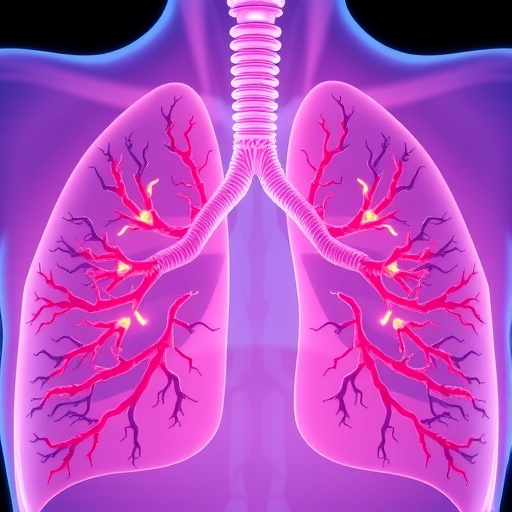In a groundbreaking advancement for the treatment of stage III locally advanced non-small cell lung cancer (NSCLC), recent research highlights the promising clinical benefits of neoadjuvant chemoimmunotherapy followed by surgical intervention. This innovative therapeutic approach combines chemotherapy with immunotherapy before surgery, aiming to optimize tumor response and improve patient outcomes in a cancer subtype traditionally associated with poor prognosis and limited treatment options.
NSCLC, accounting for the majority of lung cancer cases worldwide, poses significant challenges due to its heterogeneous nature and advanced presentation at diagnosis, particularly in stage III where tumor invasion into surrounding tissues and lymph nodes is common. Conventional treatments have often struggled to achieve durable remission or curative outcomes, necessitating new strategies that integrate immune modulation with cytotoxic agents to enhance tumor eradication.
The systemic review and meta-analysis evaluated data spanning over two decades, incorporating findings from 22 carefully selected studies encompassing a total of 1,043 patients diagnosed with stage III NSCLC. Remarkably, 892 of these patients proceeded to surgical resection following neoadjuvant chemoimmunotherapy, offering a robust dataset to assess therapeutic efficacy and safety parameters.
Central to the analysis was the measurement of major pathological response (MPR), pathological complete response (pCR), and objective response rates (ORR), which serve as critical indicators of how effectively tumors respond to preoperative treatment at both the macroscopic and microscopic levels. The pooled data revealed a notably high MPR rate of 65%, while pCR was achieved in 38% of cases, signifying substantial tumor regression post-therapy. The ORR, reflecting overall measurable tumor shrinkage, was also robust at 73%, underscoring the considerable antitumor activity elicited by the combined regimen.
Safety profiles, a paramount consideration in neoadjuvant settings, were carefully scrutinized. Treatment-related adverse events (TRAEs) occurred in 84% of patients, a figure that highlights the intense biological activity and patient tolerance challenges inherent in combining chemotherapy with immunotherapy. However, severe adverse events (SAEs) were considerably less frequent, affecting only 13% of participants, suggesting that while side effects are common, they are manageable and do not preclude surgical treatment.
Notably, the subgroup analysis illuminated differences in efficacy between various immune checkpoint inhibitors (ICIs). Specifically, regimens incorporating nivolumab and pembrolizumab, two widely studied PD-1 inhibitors, demonstrated superior outcomes with higher MPR and pCR rates compared to other ICIs. Nivolumab-based therapy yielded an MPR of 69% and a pCR of 51%, while pembrolizumab-based regimens achieved an MPR of 68% and a pCR of 38%. These findings emphasize the critical role of ICI selection in optimizing neoadjuvant treatment outcomes.
These results represent a significant paradigm shift in the management of locally advanced NSCLC. By integrating immunotherapy upfront, clinicians can potentially harness and amplify the patient’s immune response against tumor cells, converting what was once inoperable or high-risk disease into surgically resectable cases with improved prognostic prospects.
The meta-analysis draws its strength from a comprehensive and systematic search through multiple scientific databases, including Cochrane Library, PubMed, Web of Science, and Embase, ensuring a broad and inclusive capture of pertinent clinical trials and observational studies published from January 2000 through September 2024. This extensive scope adds weight to the conclusions and provides a high level of evidence supporting the adoption of chemoimmunotherapy in standard treatment protocols.
Beyond immediate therapeutic endpoints, the study also highlights the evolving landscape of lung cancer treatment, where multimodal approaches increasingly integrate immune modulation with cytotoxic treatments to overcome tumor resistance mechanisms and microenvironmental immunosuppression. This synergy not only enhances antitumor efficacy but also reformulates the biologic behavior of NSCLC, potentially eliciting long-lasting immunologic memory that may mitigate relapse risks.
From a clinical perspective, the reported data reinforce the safety and feasibility of surgical intervention following neoadjuvant chemoimmunotherapy. This is particularly relevant as surgical resection remains a cornerstone of curative intent treatment in NSCLC, and optimizing perioperative therapeutic strategies is key to improving long-term survival.
Moreover, the differential outcomes observed with specific ICIs raise important questions concerning personalized medicine approaches and biomarker-driven treatment selection. Future research that elucidates predictive factors for response will be vital to refining patient selection criteria and minimizing unnecessary treatment-related toxicity.
The study also underscores the importance of multidisciplinary care coordination, involving thoracic surgeons, medical oncologists, radiation oncologists, and pathologists, to maximize treatment sequencing and timing. This collaborative framework ensures comprehensive assessment and management of complex locally advanced disease, facilitating precision medicine approaches that adapt to individual patient profiles and tumor biology.
In summary, the meta-analytic findings provide compelling evidence that neoadjuvant chemoimmunotherapy followed by surgery offers a clinically significant benefit for patients with stage III NSCLC. With high rates of pathological response and manageable toxicity, this therapeutic strategy is poised to reshape treatment paradigms and improve survival outcomes in this challenging patient population.
As the field progresses, ongoing clinical trials and real-world studies will be instrumental in validating these findings, exploring long-term survival benefits, and optimizing immunotherapeutic combinations. The integration of immune checkpoint blockade into neoadjuvant regimens represents a transformative approach that aligns with the broader goal of precision oncology: delivering personalized, effective, and durable cancer control.
This systematic review and meta-analysis not only confirm the potential for cure in locally advanced NSCLC but also pave the way for novel treatment algorithms that leverage the immune system, heralding a new era in lung cancer therapeutics.
Subject of Research: The clinical efficacy and safety of neoadjuvant chemoimmunotherapy followed by surgery in stage III locally advanced non-small cell lung cancer (NSCLC).
Article Title: The efficacy analysis of neoadjuvant chemoimmunotherapy followed by surgery in stage III locally advanced non-small cell lung cancer: a systematic review and meta-analysis.
Article References:
Yang, X., He, Y., Guo, T. et al. The efficacy analysis of neoadjuvant chemoimmunotherapy followed by surgery in stage III locally advanced non-small cell lung cancer: a systematic review and meta-analysis. BMC Cancer 25, 1443 (2025). https://doi.org/10.1186/s12885-025-14744-2
Image Credits: Scienmag.com




